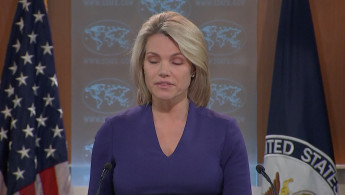Increasingly frustrated with anti-Qatar blockade, US demands 'reasonable' explanation for Saudi-led measures
The United States said it hopes the anti-Qatar alliance which imposed a blockade on Qatar would soon reveal a list of "reasonable" grievances to officials in Doha, just a day after Washington questioned the "mystified" motives behind the move.
"We understand a list of demands has been prepared and coordinated by the Saudis, Emiratis, Egyptians and Bahrainis," US Secretary of State Rex Tillerson said. "We hope the list ... will soon be presented to Qatar and will be reasonable and actionable."
The latest moves came as Washington stepped up its efforts to resolve the blockade of Qatar by its neighbours, led by Riyadh.
Later, addressing reporters after a meeting with senior Chinese officials, Tillerson said Washington had been pushing for a clear list of grievances.
"Our role has been to encourage the parties to get their issues on the table, clearly articulated, so that those issues can be addressed and some resolution process can get underway to bring this to a conclusion," he said.
"Our desire is for unity within the Gulf and unity within the GCC and that we direct all of our efforts onto the war against terror," he said, referring to the Gulf Cooperation Council, a fractious regional alliance.
 |
The more that time goes by, the more doubt is raised about the actions taken by Saudi Arabia and the UAE |  |
Two weeks ago, Riyadh and several of its allies including Egypt, Bahrain and the United Arab Emirates, cut ties with Qatar over accusations that Doha supports extremist groups - a claim Qatar vehemently denies.
In addition to diplomatic isolation, other measures taken included closing Qatar's only land border, banning its planes from using their airspace and barring Qatari nationals from transiting through their airports - a move Doha described as an illegal and unjust blockade.
On Tuesday, Tillerson's spokeswoman Heather Nauert said the US was "mystified" that Saudi Arabia and its Gulf allies have failed to present details justifying their embargo on Qatar.
"The more that time goes by, the more doubt is raised about the actions taken by Saudi Arabia and the UAE," Nauert said.
On Wednesday, US President Donald Trump discussed the Qatar row with Saudi Arabia's newly-appointed crown prince, on a call during which he also offered his congratulations to the new heir to the throne.
"The two leaders discussed the priority of cutting off all support for terrorists and extremists, as well as how to resolve the ongoing dispute with Qatar," the White House said in a statement.
Trump initially sent contradictory signals on the blockade since it began some three weeks ago, appearing to endorse it, but Washington, under the influence of Tillerson's State Department and the Pentagon, has since shown mounting frustration over the kingdom's role in the crisis.





 Follow the Middle East's top stories in English at The New Arab on Google News
Follow the Middle East's top stories in English at The New Arab on Google News


